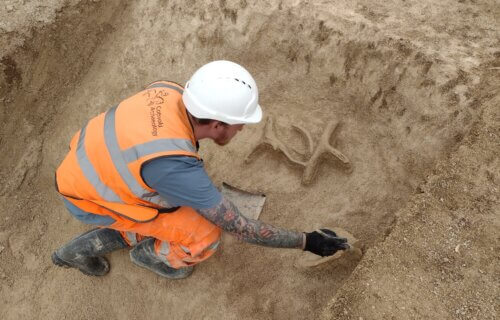
HARNHAM, United Kingdom — The mysteries of Stonehenge may be the tip of the archaeological iceberg in this region of the United Kingdom. Researchers have made another remarkable discovery just miles from the world-famous site.
While preparing for a new housing development in Harnham, just eight miles south of Stonehenge, workers unearthed items that may date all the way back to 10,000 BC. The findings include ancient pottery, knives, and even red deer antler, which was often used for making tools and weapons in prehistoric times, according to archaeologists.
Cotswold Archaeology
The abundance of water has inevitably attracted human occupation from the Mesolithic onwards (10,000 BC – 4000 BC), which has led to some interesting findings,” says Richard Greatorex, principal fieldwork manager at Cotswold Archaeology, in a statement.
Among the most intriguing discoveries are five Bronze Age barrows — ancient burial mounds — dating from around 2400 BC to 700 BC. Archaeologists also found 10 burials and numerous pits and postholes from the Neolithic and Late Bronze Age. These pits and postholes seem to suggest that this area was used for agriculture long ago.
The site has uncovered some brilliant archaeology and has been an amazing opportunity for our archaeologists to excavate and better understand how this area fits into a wider landscape of settlement,” adds Steve Bush, Cotswold Archaeology’s onsite project leader.
Another point of interest is the discovery of Iron Age lynchets — terraced land created by ancient farming methods — as well as Anglo-Saxon pottery and knives that could shed light on life in that period
The artifacts are currently undergoing further analysis. They will eventually be donated to Salisbury Museum, ensuring that they are accessible to the public for years to come.
“It has been fascinating to see what has been discovered in Harnham, as it enables us to understand the land and our heritage better as a result,” says Emma Colin, Vistry Western’s managing director.

